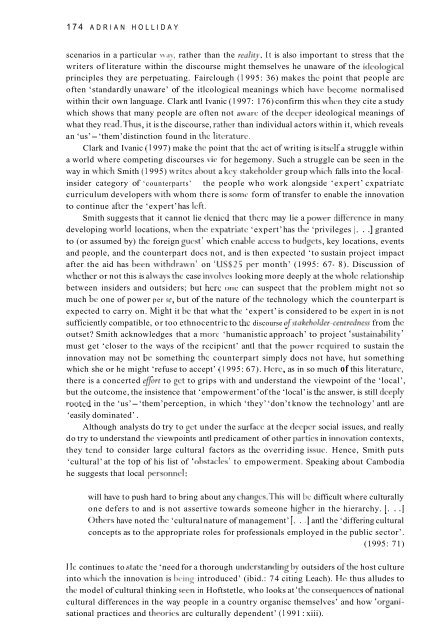Download - Search
Download - Search
Download - Search
You also want an ePaper? Increase the reach of your titles
YUMPU automatically turns print PDFs into web optimized ePapers that Google loves.
174 ADRIAN HOLLIDAYscenarios in a particular way, rather than the realiv. It is also important to stress that thewriters of literature within the discourse might themselves he unaware of the itlcologicalprinciples they are perpetuating. Fairclough (1995: 36) makes the point that people arcoften ‘standardly unaware’ of the itlcological meanings which have hecome normalisedwithin their own language. Clark antl Ivanic (1997: 176) confirm this lvhcn they cite a studywhich shows that many people are often not aware of the tlccpcr ideological meanings ofwhat they rcad.Thus, it is the discourse, rathcr than individual actors within it, which revealsan ‘us’-‘them’ distinction found in the litvraturc.Clark and Ivanic (1997) make the point that the act of writing is itsclfa struggle withina world where competing discourses vie for hegemony. Such a struggle can be seen in theway in wrhich Smith (1995) lvritcs about a kcy stakeholdcr group Lvhich falls into the localinsidercategory of ‘counterparts’ the people who work alongside ‘expert’ cxpatriatccurriculum developers hvith whom thcre is somc form of transfer to enable the innovationto continue after the ‘expert’ has left.Smith suggests that it cannot lie denied that there may lie a pohver diftercnce in manydeveloping world locations, \vhen thc expatriatc ‘expert’ has lhe ‘privileges [. . .] grantedto (or assumed by) the foreign gucst’ which enable access to budgets, key locations, eventsand people, and the counterpart docs not, and is then expected ‘to sustain project impactafter the aid has been withdrawm’ on ‘US$25 pcr month’ (1995: 67- 8). Discussion ofwhether or not this is altvays thc case involvcs looking more deeply at the whole rclationshipbetween insiders and outsiders; but here one can suspect that thc problem might not somuch be one of power per se, but of the nature of the technology which the counterpart isexpected to carry on. Might it bc that what thc ‘expert’ is considered to be expert in is notsufficiently compatible, or too ethnocentric to thc discourse ofscukeholder~cencredness from theoutset? Smith acknowledges that a morc ‘humanistic approach’ to project ‘sustainability’must get ‘closer to the ways of the rccipicnt’ antl that the po\ver required to sustain theinnovation may not be something thc counterpart simply docs not have, hut somethingwhich she or he might ‘refuse to accept’ (1995: 67). Here, as in so much of this literature,there is a concerted e@rt to get to grips with and understand the viewpoint of the ‘local’,but the outcome, the insistence that ‘empowerment’ of the ‘local’ is the answer, is still deeplyrooted in the ‘us’-‘them’ perception, in which ‘they’‘don’t know the technology’ antl are‘easily dominated’ .Although analysts do try to get under the surfacc at the deeper social issues, and reallydo try to understand the viewpoints antl predicament of other partics in innoyation contexts,they tend to consider large cultural factors as the overriding issuc. Hence, Smith puts‘cultural’ at the top of his list of ‘ohstacles’ to empowerment. Speaking about Cambodiahe suggests that local personncl:will have to push hard to bring about any changcs.This will tie difficult where culturallyone defers to and is not assertive towards someone higher in the hierarchy. [. . .]Othcrs have noted the ‘cultural nature of management’ [. . .I antl the ‘differing culturalconcepts as to the appropriate roles for professionals employed in the public sector’.(1995: 71)I IC continues to state the ‘need for a thorough understanding ly outsiders ofthe host cultureinto M-hich the innovation is king introduced’ (ibid.: 74 citing Leach). He thus alludes tothe model of cultural thinking seen in Hoftstetle, who looks at ‘the consequenccs of nationalcultural differences in the way people in a country organisc themselves’ and how ‘organisationalpractices and theorics arc culturally dependent’ (1 991 : xiii).


